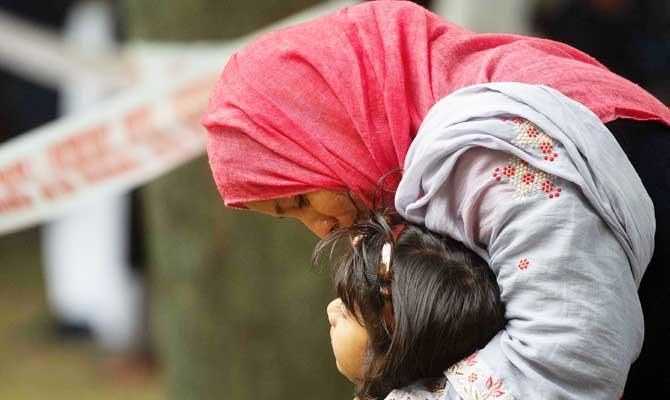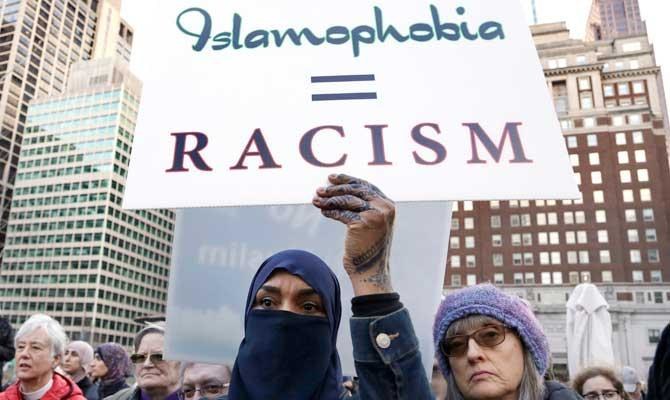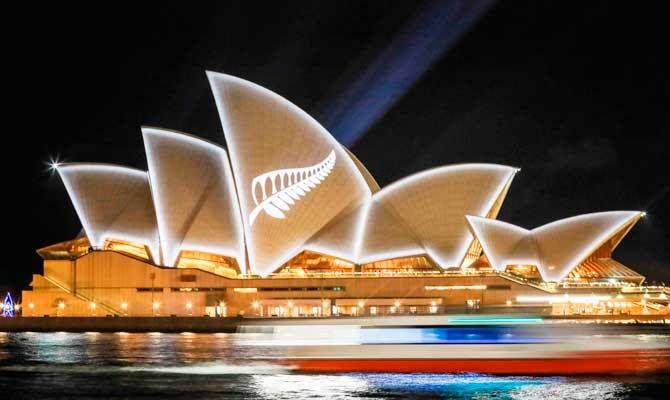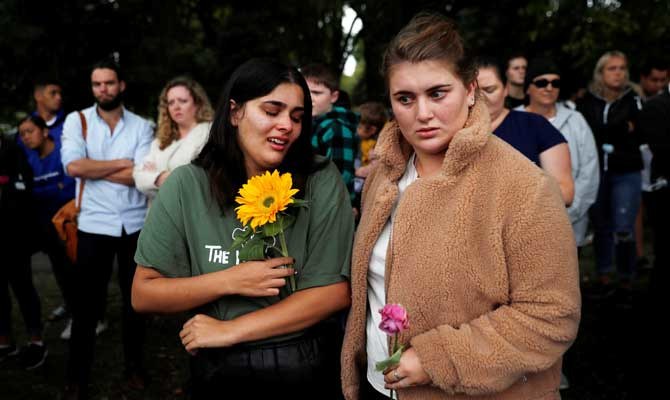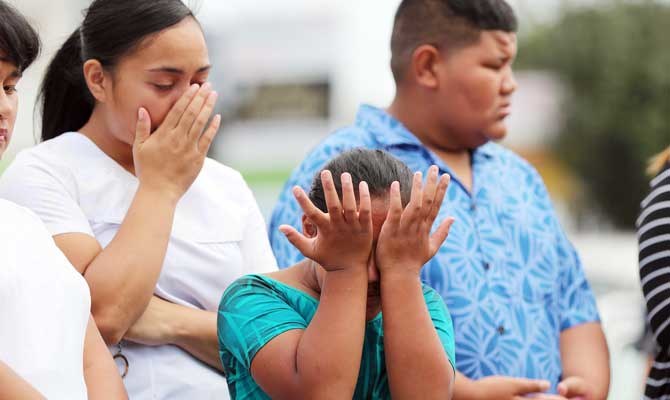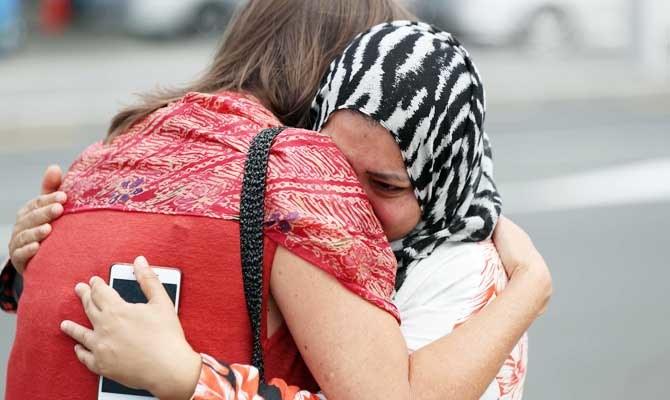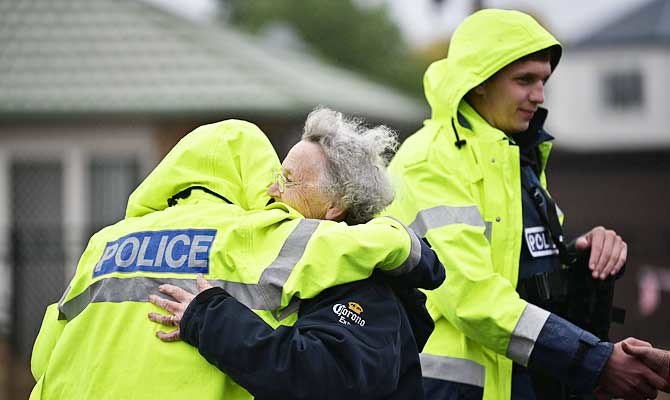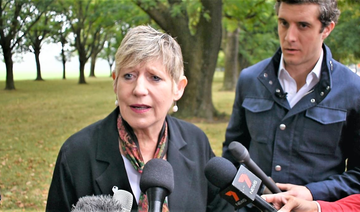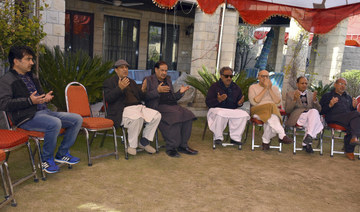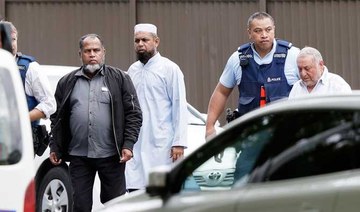CHRISTCHURCH: An attack on a New Zealand mosque took the lives of 50 worshippers Friday and left dozens more wounded when a white supremacist opened fire and live-streamed the shootings. Here are the stories of some of those killed and wounded.
THE DEAD
HUSNA AHMED
Farid Ahmed refuses to turn his back on his adopted home, despite losing his 45-year-old wife, Husna Ahmed, in the Al Noor mosque attack. They had split up to go to the bathroom when it happened.
The gunman livestreamed the massacre on the Internet, and Ahmed later saw a video of his wife being shot. A police officer confirmed she died.
Despite the horror, Ahmed — originally from Bangladesh — still considers New Zealand a great country.
“I believe that some people, purposely, they are trying to break down the harmony we have in New Zealand with the diversity,” he said. “But they are not going to win. They are not going to win. We will be harmonious.”
___
SYED AREEB AHMED, 26
Ahmed had recently moved from his house in Karachi, Pakistan, for a job in New Zealand to help support his family back home. On Saturday, Pakistan’s foreign ministry informed his family that Ahmed was among those killed during the mosque attack.
One of his uncles, Muhammad Muzaffar Khan, described him as deeply religious, praying five times a day. But education was always his first priority, Khan said.
Ahmed was an only son who had immigrated to New Zealand for work, his uncle said.
“Education had always remained his first priority,” Khan said. “He had gone to New Zealand recently where he got his job. He had only started his career, but the enemies took his life“
Family members, relatives, and friends have gathered at Ahmed’s house to express their condolences. His body is expected to arrive there in the coming days.
___
FARHAJ AHSAN, 30
The software engineer moved to New Zealand six years ago from the city of Hyderabad in India, where his parents still live, according to the Mumbai Mirror.
“We received the disturbing news,” Ahsan’s father, Mohammed Sayeeduddin told the newspaper Saturday. Friends and family had been trying to reach Ahsan since the attack.
Ahsan was married and had a 3-year-old daughter and infant son.
___
ABDULLAHI DIRIE, 4
Four of Adan Ibrahin Dirie’s five children managed to escape Friday’s attacks, but the youngest, Abdullahi, was killed, his uncle, Abdulrahman Hashi, 60, a preacher at Dar Al Hijrah Mosque in Minneapolis, told the New Zealand Herald.
Dirie also suffered gunshot wounds and was hospitalized. The family fled Somalia in the mid-1990s as refugees and resettled in New Zealand.
“You cannot imagine how I feel,” Hashi said.
He added: “He was the youngest in the family. This is a problem of extremism. Some people think the Muslims in their country are part of that, but these are innocent people.”
___
ALI ELMADANI
Elmadani and his wife immigrated from the United Arab Emirates in 1998. The retired Christchurch engineer always told his children to be strong and patient, so that’s what they are trying to do after the tragedy, his daughter, Maha Elmadani, told Stuff.
“He considered New Zealand home and never thought something like this would happen here,” she said.
She said her mother “is staying as strong as possible. My younger brother isn’t doing too well with the news.”
___
ATTA ELYAN
Atta Elyan, who was in his 30s, died of his wounds from the shooting, Muath Elyan, his uncle, told The Associated Press.
His father, Mohammed Elyan, a Jordanian in his 60s who co-founded one of the mosques in 1993, was among those wounded, said Muath Elyan, Mohammed’s brother, who said he spoke to Mohammed’s wife after the shooting.
Muath said his brother helped establish the mosque a year after arriving in New Zealand, where he teaches engineering at a university and runs a consultancy. He said his brother last visited Jordan two years ago.
“He used to tell us life was good in New Zealand and its people are good and welcoming. He enjoyed freedom there and never complained about anything,” Muath told the AP. “I’m sure this bloody crime doesn’t represent the New Zealanders.”
___
LILIK ABDUL HAMID
The longtime aircraft maintenance engineer at Air New Zealand was killed in the Al Noor mosque when he was killed, his employer said in a statement.
“Lilik has been a valued part of our engineering team in Christchurch for 16 years, but he first got to know the team even earlier when he worked with our aircraft engineers in a previous role overseas,” Air New Zealand Chief Executive Officer Christopher Luxon said. “The friendships he made at that time led him to apply for a role in Air New Zealand and make the move to Christchurch. His loss will be deeply felt by the team.
Hamid was married and had two children, Luxon said.
“Lilik, his wife Nina and their children Zhania and Gerin are well known and loved by our close-knit team of engineers and their families, who are now doing all they can to support the family alongside our leadership team and the airline’s special assistance team,” he said.
___
MUCAAD IBRAHIM, 3
At just 3 years old, Mucaad Ibrahim is the youngest known victim of the attacks. He was separated from his older brother Abdi and their father when the shooting began at the Al Noor mosque.
After an agonizing search by the family, Abdi said police finally confirmed that the toddler had been killed.
Mucaad was born and raised in Christchurch. He was beloved by the community, known for his energetic demeanor and easy laugh. He was bright and bubbly, and loved playing with an iPad.
Ahmed Osman, a close family friend, said Mucaad used to cheer from the sidelines as Osman and Abdi played soccer on Friday evenings at a park near the mosque. The little boy had planned to watch them play soccer as usual on Friday. He never made it.
Osman said the support of the community has helped the family pull through.
“New Zealand is always behind us,” he said. “Even when we walk down the street, people stop us and say, ‘Are you guys OK?’ That’s what New Zealand is about. It’s all about coming together. One person cannot stop us.”
___
This story corrects the spelling of Mucaad Ibrahim’s first name.
___
MOHAMMAD IMRAN KHAN
A handwritten cardboard sign outside Mohammad Imran Khan’s restaurant, the Indian Grill in Christchurch, on Sunday said simply CLOSED. A handful of pink flowers laid nearby.
The owner of the convenience store next door, JB’s Discounter, Jaiman Patel, 31, said he helped the staff with the keys after the terrorist attack that claimed Khan’s life.
“He’s a really good guy. I tried to help him out with the setup and everything,” Patel said. “We also put the key out for them when the terrorists come, and sorted it out for him.”
Khan had a son who was 10 or 11, Patel said.
The two were business neighbors who helped each other out when needed, he said.
“We are helping each other. It’s so sad.”
___
SAYYAD MILNE, 14
Milne was described as a good-natured, kind teenager. The high school student was at the Al Noor mosque for Friday prayers when the attack started, his half-sister, Brydie Henry, told the Stuff media outlet.
Sayyad was last seen “lying on the floor of the bloody mosque, bleeding from his lower body,” she said her father told her.
Sayyad’s mother, Noraini, was also in the mosque and managed to escape, Henry said. The teenager has two other siblings, 15-year-old twins Shuayb and Cahaya.
“They’re all at home just waiting. They’re just waiting and they don’t know what to do,” Henry told the news site.
___
JUNAID MORTARA, 35
Javed Dadabhai is mourning for his gentle cousin, 35-year-old Junaid Mortara, believed to have died in the first mosque attack.
His cousin was the breadwinner of the family, supporting his mother, his wife and their three children, ages 1 to 5. Mortara had inherited his father’s convenience store, which was covered in flowers on Saturday.
Mortara was an avid cricket fan, and would always send a sparring text with relatives over cricket matches when Canterbury faced Auckland.
___
HAJI DAOUD NABI, 71
Nabi moved his family to New Zealand in 1979 to escape the Soviet-Afghan war. Days before the shootings, his son, Omar, recalled his father speaking about the importance of unity.
“My father said how important it is to spread love and unity among each other and protect every member of the society we live in,” Omar told Al-Jazeera.
Omar told the news network his father ran an Afghan Association and helped refugees settle in to a new country.
“He used to make them feel at home,” Omar said.
___
HUSNE ARA PARVIN, 42
Parvin died being struck by bullets while trying to shield her wheelchair-bound husband, Farid Uddin Ahmed, her nephew Mahfuz Chowdhury told The Daily Star , a Bangladesh newspaper.
Chowdhury said Uddin had been ill for years and Parvin took him to the mosque every other Friday. She had taken him to the mosque for men while she went to the one for women. Mahfuz said relatives in New Zealand told him when the shootings began, Parvin rushed to her husband’s mosque to protect him. He survived.
The Bangladeshi couple had moved to New Zealand sometime after 1994, Chowdhury said.
___
NAEEM RASHID, 50, and TALHA RASHID, 21
As the shootings unfolded, Naeem Rashid is seen on video trying to tackle the gunman, according to Rashid’s brother, Khurshid Alam.
“He was a brave person, and I’ve heard from a few people there, there were few witnesses . they’ve said he saved a few lives there by trying to stop that guy,” Alam told the BBC .
Rashid’s son, Talha Rashid, is also among the dead. Pakistan’s Ministry of Public Affairs confirmed their deaths in a tweet .
The elder Rashid was a teacher in Christchurch and was from Abbottabad, Pakistan. His son was 11 when his family moved to New Zealand. He had a new job and planned to get married.
___
HUSSEIN AL-UMARI
An Iraqi who born in Abu Dhabi was killed in the attack on two mosques in New Zealand.
His mother wrote on social media that Hussein Al-Umari was killed.
His family and friends had been seeking information on Al-Umari, in his mid-30s, who had failed to return after going to Friday prayers at the Al Noor mosque in Christchurch.
His mother, an Iraqi calligraphy artist named Janna Ezzat, wrote on Facebook that her son had become a martyr.
Ezzat wrote: “Our son was full of life and always put the needs of others in front of his own.”
___
INDIAN CITIZENS KILLED
India’s ambassador to New Zealand issued the following names of Indian citizens who were killed in the mosque attacks:
— Maheboob Khokhar
— Ramiz Vora
— Asif Vora
— Ansi Alibava
— Ozair Kadir
Indian news reports said Alibava, 25, had moved to New Zealand last year after marrying Abdul Nazar.
The Indian Express newspaper said she was studying agriculture technology at Lincoln University and her husband worked at a supermarket in Christchurch. They got married in 2017.
The Manorama Online news site said her mother, Rasia, had prayed for the safety of the two when the news broke of the attacks.
Alibava used to call her family back in India every day, but they were worried when there was no call after the shootings. They later found out from the husband what had happened.
The report said she was hoping to find a job in New Zealand to support her family back home.
___
MORE PAKISTANI VICTIMS IDENTIFIED
Pakistan’s foreign ministry confirmed nine Pakistanis were killed in the Christchurch mosque attacks. They have been identified as follow:
Zeeshan Raza, his father Ghulam Hussain and mother Karam Bibi, Sohail Shahid, Syed Jahandad Ali, Syed Areeb Ahmed, Mahboob Haroon, Naeem Rashid and his son Talha Naeem.
Naeem Rashid and his son Talha Naeem, 22, died after trying to disarm the shooter.
Rashid’s brother Dr. Mohammad Khursheed, who lives in Pakistan’s garrison city of Abbottabad, received an emotional call from his sister-in-law telling him of his brother’s death. He died along with his son Talha Naeem .
Khursheed said his brother had already bought his plane ticket to Pakistan for a May family reunion. “He was very brave. He snatched the gun and I think he saved many lives,” Khursheed said.
Rashid had migrated to New Zealand in 2009. He was teacher here and same profession he had adopted there and so his wife.
Rashid’s 75-year-old mother Bedar Bibi was devastated and wanted to fly to New Zealand for a last look at her son and grandson. “I want the New Zealand government should take me there so I can have one last look of my beloved son and my grandson Talha,” she said.
The foreign ministry provided more information about other citizens who died in the attacks:
— Sohail Shahid, son of Muhammad Shabbir, age 40.
— Syed Jahanand Ali, age 34.
— Mahboob Haroon, son of Shahid Mehboob, resident of Rawalpindi, age 40.
___
THE WOUNDED
ELIN DARAGHMEH
A Palestinian woman says her 4-year-old daughter is fighting for her life while her husband is in serious but stable condition after being wounded in the mosque shooting.
Asmaa Daraghmeh, 27, said the family moved to New Zealand from Jordan four years ago when her husband received a permit to work as a hair dresser.
“It was a great opportunity,” she said, crying on the phone. “The country is safe, beautiful and hospitable.”
She spoke from the Auckland hospital where their daughter, Elin, remained in intensive care. Her husband, 33, was being transported to the same hospital.
Asmaa said she is a devout Muslim who was active in the mosque.
“Our life was great in this great country until this devil appeared and turned it to hell,” she said.
___
SHIHADEH NASASRAH
Shihadeh Nasasrah, 63, who was wounded in the New Zealand mosque shooting, said he spent terrifying minutes lying underneath two dying men as the gunman kept firing.
The assailant “would go out and bring more ammunition and resume shooting,” said Nasasrah, speaking by phone from a Christchurch hospital where he was recovering from two shots to the leg. “Every time he stopped, I thought he was gone. But he returned over and over again. I was afraid to leave because I didn’t know the safest way out. I died several times, not one time.”
Nasasrah had attended Friday prayers at the Al Noor Mosque with his friend, Abdel Fattah Qasim, 60, who was killed in the shooting. Both were originally from the West Bank — Nasasrah from the town of Beit Furik and Qasim from the town of Arabeh.
Nasasrah said about 200 to 300 worshippers were in the mosque for Friday prayers, and that he and his friend were sitting in the front, near the imam, or prayer leader. The imam was delivering the sermon when the gunman burst into the mosque, he said.
“Panic spread all over the place,” Nasasrah said. “Some started saying Allahu Akbar (God is great). We scrambled to leave toward a second door that leads to a hall and then to the street, but the bullets brought us down.”
“Two people came on top of me, and he (the gunman) approached us and opened fire. Both were killed and I felt them dying,” Nasasrah said. “I felt their blood. I myself was shoot and I thought ‘I’m dying’.”
He said he uttered the words that devout Muslims speak before their death — “there is no God but Allah, and Mohammed is his messenger.”
Nasasrah, a car dealer, said most of the worshippers were from Asia, including Indonesia, India, Singapore and Malaysia, and that Arabs made up a smaller part of the congregation.
The attack left him and other Muslims in the area worried and puzzled.
“I never heard a racist word in this country,” he said. “I don’t know what happened and why. I will not leave this country. Our lives are well established here, our homes, works, family is here and we will not leave.”
As a young man, Nasasrah studied English in the Syrian capital of Damascus, and then worked as a translator at the New Zealand embassy in Saudi Arabia for 14 years. The father of three moved to New Zealand in 1990. His three children graduated from universities in New Zealand and have established their lives in the country.
___
MUHAMMAD AMIN NASIR, 67
Nasir and his son were just 200 meters (219 yards) from the Al Noor mosque on Friday when everything went wrong. They had no idea that a white supremacist had just slaughtered at least 41 people inside the mosque. A car that had been driving by suddenly stopped, and a man leaned out the window pointing a gun at them.
They ran as the bullets began to fly. But at 67, Nasir could not keep up with his 35-year-old son. He fell behind by two or three fateful steps.
The gunman drove away. A pool of blood poured from Nasir’s body.
Nasir, who lived in Pakistan, had been regularly visiting his son in New Zealand.
He was on the third week of his visit when he was shot. He remains in an induced coma with critical injuries, though his condition has stabilized.
___
ADEEB SAMI, 52
As the rampage inside the mosque began, Sami was shot in the back as he dove to protect his two sons, Abdullah, 29, and Ali, 23, the Gulf News reported.
“My dad is a real hero. He got shot in the back near his spine in an attempt to shield my brothers but he didn’t let anything happen to them,” Adeeb’s daughter, Heba, 30, told the Gulf News.
Sami, described by the Gulf News as a Dubai-based New Zealander of Iraqi origin, underwent surgery to remove the bullet and his daughter said he’s recovering.
Stories of the victims of the New Zealand mosque attack
Stories of the victims of the New Zealand mosque attack

- The document provides the names of 44 men and four women, and so is missing the identities of two of the 50 victims confirmed as dead by police
- Another 34 victims remained at Christchurch Hospital, where officials said 12 were in critical condition
Spanish PM: Israel should be excluded from Eurovision

- Spanish PM Pedro Sanchez expressed solidarity with the people of Palestine 'who are experiencing the injustice of war'
- Russia has not been allowed to participate in Eurovision since its 2022 invasion of Ukraine
MADRID: The Eurovision song contest should exclude Israel, Spanish Prime Minister Pedro Sanchez said on Monday, expressing solidarity with “the people of Palestine who are experiencing the injustice of war and bombardment.”
The intervention by Sanchez, one of the most outspoken critics of Israel’s devastating war in Gaza, comes after protests against Israeli participation marked last weekend’s extravaganza in Switzerland.
Russia has not been allowed to participate in Eurovision since its 2022 invasion of Ukraine.
“Therefore Israel shouldn’t either, because what we cannot allow is double standards in culture,” Sanchez said at an event in Madrid.
“Spain’s commitment to international law and human rights must be constant and must be coherent. Europe’s should be too,” added the Socialist leader.
Ahead of the Eurovision final on Saturday, Spanish public broadcaster RTVE aired a message in support of Palestinians — despite being warned to avoid references to Gaza by Eurovision organizers the European Broadcasting Union (EBU).
In April, RTVE wrote to the EBU requesting a “debate” over Israeli participation amid civil society “concerns” about the situation in Gaza, where the risk of famine is rising.
Sanchez, who last year recognized a Palestinian state, also expressed on Monday “a supportive embrace for the people of Ukraine and the people of Palestine who are experiencing the injustice of war and bombardment.”
At an Arab League summit in Baghdad on Saturday, the Socialist leader called for more international pressure on Israel to stop the “massacre in Gaza.”
The occupied Palestinian territory has been under a complete aid blockade by Israel since March 2.
Spain will submit a proposal to the United Nations General Assembly to ask the International Court of Justice to rule on Israel’s compliance with international obligations on humanitarian aid access to Gaza, Sanchez added.
Hamas’s October 2023 attack on Israel resulted in the deaths of 1,218 people, mostly civilians, according to an AFP tally based on official Israeli figures.
Hamas also took 251 hostages during the attack, 57 of whom remain in Gaza, including 34 the military says are dead.
Israel’s retaliatory offensive has killed 53,339 people in Gaza, mainly civilians, according to the health ministry in Hamas-run Gaza.
The UN considers the ministry’s figures to be reliable.
First Filipino pilgrims depart Manila for Hajj

- 5,000 Filipino Muslims are expected to perform the pilgrimage this year
- Special Hajj flights from the Philippines will operate through May 29
MANILA: Philippine officials and Saudi Arabia’s ambassador saw off on Monday the first group of Filipino pilgrims departing from Manila to Madinah to take part in this year’s Hajj.
A total of 5,000 Filipino Muslims are set to undertake the spiritual journey that is one of the tenets of Islam.
Saudi Ambassador Faisal bin Ibrahim Al-Ghamdi accompanied hundreds of them as they prepared to board flights operated by Saudia, the Kingdom’s national flag carrier, at the Manila airport.
“As you embark on this sacred journey, I pray that your Hajj is accepted, your efforts are rewarded, and your deeds are righteous,” he told the pilgrims.
“I wish to assure you, dear brothers and sisters, that the relevant authorities in the Kingdom have completed all preparations to receive the pilgrims in line with the leadership’s clear commitment to making the Hajj experience smooth and spiritually fulfilling for all.”

Muslims constitute roughly 10 percent of the country’s 110 million predominantly Catholic population. The majority of them live on the southern island of Mindanao and the Sulu archipelago, as well as in the central-western province of Palawan.
The last of the special Hajj flights carrying Philippine Muslims to Saudi Arabia will depart on May 29 as the annual pilgrimage is expected to begin on June 4.
“As you embark on this sacred journey to the blessed place … may your hearts be filled with peace, prosperity and gratitude,” National Commission on Muslim Filipinos chairman Sabuddin Abdurahim said during the sendoff ceremony.
“Hajj is not only a physical journey, but it is a profound spiritual transformation where you will be going to reflect, to purify your souls, and renew your commitment to a new life of compassion, humility, and righteousness.”
Sahawi Mua, a pilgrim from Marawi, said he waited almost 10 years to be able to save money and take part in the pilgrimage.
“(With) the help of the Almighty … I prepared for this not only financially but also physically and health-wise, and hopefully I’ll be successful,” he told Arab News.
“I’ve prepared myself my whole life.”
For Marion Gandawali and his wife, the wait was even longer. Farmers from Lanao del Norte, they will be visiting Makkah and Madinah for the first time.
“We waited for 40 years … Whatever we earned from farming corn, coconut, we saved it all, our whole life, to get this chance to perform the Hajj,” Gandawali said.
“Even though we waited a long time, it was all worth it as my wife and I are doing this together.”
Pope Leo XIV and JD Vance meet ahead of US-led diplomatic flurry to reach ceasefire in Ukraine

- Vance, a Catholic convert, had led the US delegation to the formal Mass opening the pontificate of the first American pope
ROME: Pope Leo XIV and US Vice President JD Vance met at the Vatican on Monday ahead of a flurry of US-led diplomatic efforts to make progress on a ceasefire in Russia’s war in Ukraine.
Vance, a Catholic convert, had led the US delegation to the formal Mass opening the pontificate of the first American pope. Joining him at the meeting on Monday was Secretary of State Marco Rubio, also a Catholic, Vance spokesperson Luke Schroeder said.
“There was an exchange of views on some current international issues, calling for respect for humanitarian law and international law in areas of conflict and for a negotiated solution between the parties involved,” according to a Vatican statement after their meeting.
The Vatican listed Vance’s delegation as the first of several private audiences Leo was having Monday with people who had come to Rome for his inaugural Mass, including other Christian leaders and a group of faithful from his old diocese in Chiclayo, Peru.
The Vatican, which was largely sidelined during the first three years of Russia’s invasion of Ukraine, has offered to host any peace talks while continuing humanitarian efforts to facilitate prisoner swaps and reunite Ukrainian children taken by Russia.
After greeting Leo briefly at the end of Sunday’s Mass, Vance spent the rest of the day in separate meetings, including with Ukrainian President Volodymyr Zelensky. He also met with European Union Commission President Ursula von der Leyen and Italy’s Premier Giorgia Meloni, who said she hoped the trialateral meeting could be a “new beginning.”
In the evening, Meloni spoke by phone with US President Donald Trump and several other European leaders ahead of Trump’s expected call with Russia’s President Vladimir Putin on Monday, according to a statement from Meloni’s office.
‘Every Effort’
Leo, the former Cardinal Robert Prevost, is a Chicago-born Augustinian missionary who spent the bulk of his ministry in Chiclayo, a commercial city of around 800,000 on Peru’s northern Pacific coast.
In the days since his May 8 election, Leo has vowed “every effort” to help bring peace to Ukraine. He also has emphasized his continuity with Pope Francis, who made caring for migrants and the poor a priority of his pontificate.
Before his election, Prevost shared news articles on X that were critical of the Trump administration’s plans for mass deportations of migrants.
Vance was one of the last foreign officials to meet with Francis before the Argentine pope’s April 21 death. The two had tangled over migration, with Francis publicly rebuking the Trump administration’s deportation plan and correcting Vance’s theological justification for it.
Pets with a toolkit: Protection dogs train to handle burglars as sports stars boost home security

- Expensive protection dogs have been in demand among professional athletes to guard against burglars who target wealthy homes as part of sophisticated rings
- The lengthy list of athletes whose residences have been hit includes England cricket captain Ben Stokes’ home was burglarized while he was playing in Pakistan
EMBOROUGH, England: Scream all you want, but Lobo isn’t letting go.
The young German shepherd has chomped into the arm of a would-be attacker wearing a padded suit at K9 Protector in southwest England.
A command later, Lobo is back at the feet of Alaster Bly and awaiting his next instruction.
“I describe them as pets with a toolkit built into them. A toolkit that you hope you’re never going to use,” said Bly, K9 Protector co-owner.
Expensive protection dogs like Lobo have been in demand among professional athletes to guard against burglars who target wealthy homes often as part of sophisticated crime rings. Athletes are particularly vulnerable while they’re away at games.
“He will end up in somebody’s home with high-net worth that is potentially at risk from more than your opportunist burglar,” Bly said of Lobo, who costs 45,000 pounds ($60,000) and boasts a Bavarian bloodline that is “second to none.”
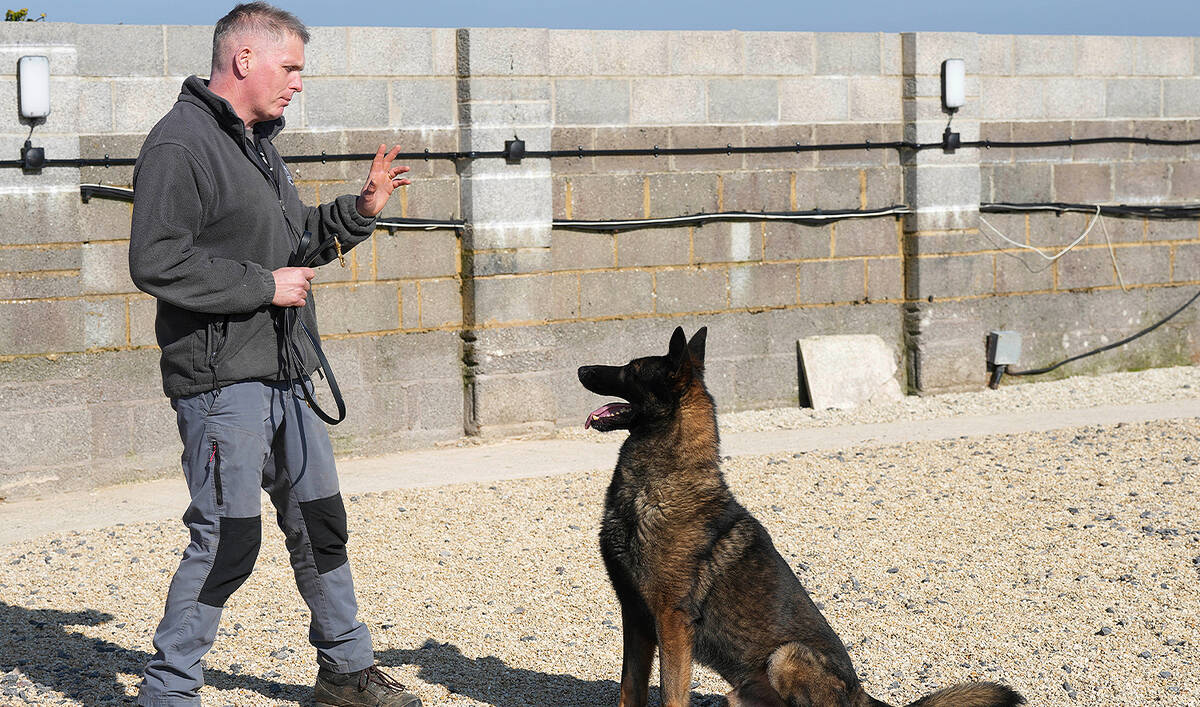
The lengthy list of athletes whose residences have been hit includes Premier League stars Jack Grealish and Alexander Isak. England cricket captain Ben Stokes’ home was burglarized while he was playing in Pakistan.
It’s becoming a major problem in the United States, too, with former NFL cornerback Richard Sherman a recent example.
The homes of Kansas City Chiefs teammates Patrick Mahomes and Travis Kelce were burglarized in October as part of a wave of break-ins that also targeted Cincinnati Bengals quarterback Joe Burrow. Seven Chilean men were charged in connection with those burglaries, as well as the break-in at Milwaukee Bucks forward Bobby Portis’ home, where nearly $1.5 million in cash and valuables were stolen.
After consulting the FBI, the NBA drew up guidance for players.
One of the recommendations: “Utilize dogs for home protection.”
WHICH BREED IS BEST?
While almost any dog can provide some deterrence, protection-dog providers offer breeds like German shepherd, Belgian Malinois, Rottweiler, Doberman and Cane Corso.
Bly and his wife, K9 Protector co-owner Sian Bly, work predominantly with German shepherds.
“They are the most proven dogs at being family dogs,” Alaster Bly said.
They begin to differentiate early on which pups show potential.
“If we’ve got a puppy that’s really confident, is chasing a rag, biting hold of the rag, and their food drive is high, that’s a good starting point,” Sian Bly said. “We look at how competitive they are with their siblings, as well. You’re looking for quite a strong dog.”
Dogs that don’t make the cut might get routed to prison service or police duty.
“You can’t place a dog with young kids that’s nervous or that the temperament isn’t 100 percent,” she said.
PROTECTION DOGS ARE EXPENSIVE
The handful of K9 Protector dogs that reach “high-threat environment” status cost up to 75,000 pounds ($100,000).
It can take a couple of years to train for all sorts of scenarios.
“It’s vast — the ability to deal with four intruders at once, vehicle carjacking tactics, being acceptant of multi-handlers,” Alaster Bly said. “Husband, wife, nanny, housekeeper, estate manager all being able to handle that dog in an equal way in a threat scenario, and the dog still responding in the same way — is very different to a pet-level-trained dog with protection training.”
Clients must be a good match, though.
Sian Bly said if they think a buyer “might use the dog in the wrong way, then we don’t sell them the dog. It doesn’t matter about the finances.”
Between 10-15 percent of their clients are professional athletes and they typically require nondisclosure agreements, as do the actors and singers who come calling.
They sell about two or three dogs per month. When the economy is bad and crime increases — demand is higher. Winter months see more sales and the pandemic period of 2020-21 was “the busiest we’ve ever been,” Sian Bly said.
UFC FIGHTER ASPINALL PICKS A GERMAN SHEPHERD
UFC heavyweight Tom Aspinall added a protection dog to his family after moving to a new house. The Manchester native posted a video about it.
“I’m not here all the time. I just wanted someone else kind of looking after the family, as well as me, even when I’m here,” Aspinall said of his German shepherd.
US soccer midfielder Tyler Adams opted for a Rottweiler from Total K9, the North Yorkshire company that provided Aspinall’s dog.
Tottenham midfielder James Maddison got a 145-pound Cane Corso from Leicestershire-based Chaperone K9, which also counts Grealish as a client.
Grealish’s mansion was burglarized just after Christmas in 2023 while the Manchester City midfielder was playing a game at Everton. Family members called police when they heard noises and after Grealish’s Belgian Malinois and Cockapoo reportedly started barking.
Grealish later called it “a traumatic experience for all of us, I am just so grateful that nobody was hurt.”
TIPS FOR HOME SECURITY
The NBA memo urged removing online real estate listings that show interiors.
Some stars post their protection dogs on social media along with the pets’ names — but they probably shouldn’t.
“There is nothing more off-putting to a dog than being called by its own name when you’re breaking into the home,” Alaster Bly said.
The Blys use German commands, which buyers must learn.
On K9 Protector’s website, former long-distance runner Mo Farah, a four-time Olympic champion, described turning to a protection dog after his home was burglarized despite an alarm system, video coverage and 24-hour security patrols.
Intruders at Burrow’s house eluded manned security at his property while he was playing a Monday Night Football game at Dallas in December. The criminal complaint on the Chilean crew said they liked to approach from “a wooded or dark area.”
KNOWING THE RULES
Under the UK’s “Guard Dogs Act,” someone capable of controlling a guard dog must be at the premises, and a notice must be posted at the entrance about the dog.
Technically, there are scenarios that could result in criminal prosecution of dog owners in Britain — even in burglaries.
The National Association of Security Dog Users “does not promote the use of dogs as personal/family protection dogs and issues no certification or training courses in relation to this type of dog,” said Roger Flett, a NASDU director.
Samantha Gaines of the Royal Society for the Prevention of Cruelty to Animals warned against the “glamorization” of painful ear-cropping on breeds like Doberman and Cane Corso. The procedure is prohibited in England and Wales, but it’s legal to import them that way.
UK BURGLARIES ARE DECREASING
It’s unknown if break-ins at wealthy homes are increasing, but statistics for England and Wales show residential burglaries overall are decreasing.
From the year ending March 2018 to the year ending September 2024, there was a 42 percent drop, according to figures from the Office for National Statistics.
Just a small percentage of burglaries get solved, however. Only in late 2022 did police chiefs commit to responding to all break-ins.
Alaster Bly, a former police officer, said it’s not just about burglaries. A CEO of a company might be facing a threat, or a person might be dealing with a stalker.
“There are life-changing incidents that take place regularly,” he said. “The array of problems and crime that’s going on in the UK at the moment keeps us busy.”
Almost all nations miss UN deadline for new climate targets

- Just 10 of nearly 200 countries required under the Paris Agreement to deliver fresh climate plans by February 10 did so on time
- Under the climate accord, each country is supposed to provide a steeper headline figure for cutting heat-trapping emissions by 2035
Just 10 of nearly 200 countries required under the Paris Agreement to deliver fresh climate plans by February 10 did so on time, according to a UN database tracking the submissions.
Under the climate accord, each country is supposed to provide a steeper headline figure for cutting heat-trapping emissions by 2035, and a detailed blueprint for how to achieve this.
Global emissions have been rising but need to almost halve by the end of the decade to limit global warming to levels agreed under the Paris deal.
UN climate chief Simon Stiell has called this latest round of national pledges “the most important policy documents of this century.”
Yet just a handful of major polluters handed in upgraded targets on time, with China, India and the European Union the biggest names on a lengthy absentee list.
Most G20 economies were missing in action with the United States, Britain and Brazil — which is hosting this year’s UN climate summit — the only exceptions.
The US pledge is largely symbolic, made before President Donald Trump ordered Washington out of the Paris deal.
There is no penalty for submitting late targets, formally titled nationally determined contributions (NDCs).
They are not legally binding but act as an accountability measure to ensure governments are taking the threat of climate change seriously.
Last week, Stiell said submissions would be needed by September so they could be properly assessed before the UN COP30 climate conference in November.
A spokeswoman for the EU said the 27-nation bloc intended to submit its revised targets “well ahead” of the summit in Belem.
Analysts say China, the world’s biggest polluter and also its largest investor in renewable energy, is also expected to unveil its much-anticipated climate plan in the second half of the year.
The UAE, Ecuador, Saint Lucia, New Zealand, Andorra, Switzerland and Uruguay rounded out the list of countries that made Monday’s cut-off.
The sluggish response will not ease fears of a possible backslide on climate action as leaders juggle Trump’s return and other competing priorities from budget and security crises to electoral pressure.
Ebony Holland from the London-based International Institute for Environment and Development said the US retreat was “clearly a setback” but there were many reasons for the tepid turnout.
“It’s clear there are some broad geopolitical shifts underway that are proving to be a challenge when it comes to international cooperation, especially on big issues like climate change,” she said.


